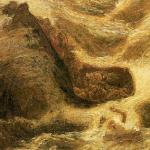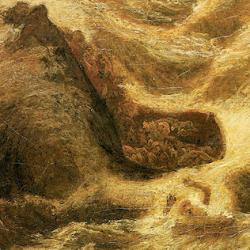As it turns out, Jonah is not very successful at flight. He goes down, down, down, but as he descends he continues to witness as a prophet.
When the Lord throws a storm on the sea, the sailors wake Jonah to ask him to call on his god for help. When the lots indicate that Jonah is the reason for the storm, he confesses that he serves the God of heaven who made sea and land (1:9). It’s an alarming confession: Why would he try to flee by sea if the God he serves is Lord of the sea?
Jonah knows what will save the ship: He has to be tossed into the ocean. Then the ship and sailors will be saved. The sailors are reluctant at first, but finally agree. But when they toss Jonah into the ocean, they ask Yahweh to pardon them (1:14): They don’t invoke “God” in general, but Yahweh, the God of the Hebrews. And when tossing Jonah in the sea calms the storm, “they offered a sacrifice to Yahweh and made vows” (1:16).
Jonah flees from the face of Yahweh. He doesn’t want to be a prophet anymore. But it’s harder to stop being a prophet than he realizes. And in the midst of his descent and flight, he converts a shipload of Gentile sailors. He becomes a light to the Gentiles in spite of himself. He becomes a light to the Gentiles by letting the Gentiles put out his light.
It’s a preview of what is going to happen in the next cycle.
Jonah is swallowed by a great fish, and then vomited back out on the land. He’s back where he started, and the story starts over again. The book of Jonah begins with “the word of Yahweh came to Jonah the son of Amittai, saying, ‘Arise, go to Nineveh the great city’” (1:1-2). Then, after Jonah’s death and resurrection, once again “the word of Yahweh came to Jonah the second time, saying, ‘Arise, go to Nineveh the great city’” (3:1-2).
This time, Jonah complies. He warns that the Lord will overthrow the city in forty days. Like the sailors, the residents of Nineveh hear and respond. They call a fast and put on sackcloth. The king of Nineveh abdicates: he gets off his throne, takes off his royal robe, covers himself with sackcloth, and sits in the dust. He puts aside his own authority as king to submit to King Yahweh, whose messenger has come to warn about the city’s destruction.
No king of Israel ever responded to a prophet like this. Yahweh sends prophet after prophet to Samaria to confront the kings of Israel. They close their ears, harden their hearts, refuse to repent. Now a lone prophet shows up for three days in Nineveh, and they repent in sackcloth and ashes. Even their animals mourn. Assyrian beasts are more pious than Israel’s people. It is a perfect provocation to jealousy.
It works: Fasting, sackcloth, lamentation, confession turn Yahweh from His anger. And He “relented of the calamity which He had declared He would bring on them. And He did not do it” (3:10). He runs from Yahweh, but still converts sailors; he obeys Yahweh, and converts a city. He can’t stop being a prophet. Willingly or not, Jonah extends Yahweh’s blessing to the nations.
When Jonah’s story is told in Israel, it’s supposed to awaken them. They’re supposed to see the Lord’s compassion. The Ninevites will show them how to repent. The Lord abandoned them because He was angry, but the Israelites will see that He will turn back to them when they turn to Him. This story is gospel to the Israelites, designed to provoke them to jealousy so they, like Nineveh, will be saved.
Jonah, of course, isn’t pleased by the outcome. Yahweh’s mercy offends him. After he preaches in the city, he goes outside, sets up a booth, and waits for fire to fall. He didn’t want the Lord to spare the city, and he’s unhappy when He does. He knows that Assyria, now spared from destruction, is soon going to demolish the northern kingdom. He knows that Assyria’s conversion comes at the cost of Israel’s destruction.
Jonah’s life is an allegory. He is a prophet in Israel, and stands for the nation. He flees from his calling, as Israel abandoned her calling of serving Yahweh as a witness to the nations.
His experience on the sea foreshadows Israel’s future. Like Jonah, Israel is going to be thrown into the raging sea of nations. Like Jonah, she is going to sink to the place of the dead, to the roots of the mountains. Like Jonah, she is going to die.
But the Lord won’t leave her in Sheol. He will appoint a great sea monster, a Gentile empire, to swallow Israel, to bring her from the depth of the sea, and to vomit her back onto the land. Jonah’s experience at sea is a preview of Israel’s exile and return.
The punch line of the book comes in the aftermath of Jonah’s death and resurrection. After Israel has descended to the depths and returned, how will she regard her Gentile protectors? Will she be grateful to the monster who rescued her – Babylon and Persia? Will she still be hoping for fireworks? The dead-and-risen Jonah represents the challenge to post-exilic Jews: Will they have compassion on Gentiles who are saved by their witness? Will she repent when she hears the story of Nineveh’s repentance? Will the provocation provoke?
Jonah’s example is not encouraging. Even after the Lord has rescued Israel from death, she will try to avoid her calling.
“I will give you no sign but the sign of Jonah,” Jesus said. But what is the sign of Jonah? It is death and resurrection. Jesus makes this explicit. As Jonah was in the heart of the sea for three days and three nights, so will the son of man be in the heart of the earth.
But the sign of Jonah isn’t merely Jesus’ death and resurrection. It’s also the aftermath. After Jonah plunged into the sea and returned, he preached in a Gentile city and converted the whole city. That is, after his death and resurrection, the Lord carried out the provocation to jealousy that he started with – He turned from Israel to the Assyrians. And that provoked Jonah not to jealousy but to resentment about the Lord’s mercy.
This is the sign of Jonah in the New Testament as well: Not only that Jesus the prophet dies and rises, but that, after His rising again, the Lord sends His apostles to preach to the Gentiles. Not only that Jesus and rises, but that, after His rising, the Jews resist the full inclusion of Gentiles into the church.
There’s another wrinkle here.
Jonah wants the nations to be blessed in Abraham’s seed, but not at the price of Israel’s destruction. In this too he symbolizes the nation. Jews of course want the nations to serve Yahweh, but not if it comes at the cost of Israel’s own death, not if it means that the Assyrians and Babylonians will dismantle their national institutions – kingship, temple, land. If Israel has to die for the nations to be blessed, they want no part of it.
Israel’s death is the only way for Israel to bring Yahweh’s blessing to the nations. When Jonah is aboard the ship to Tarshish, the Lord throws a storm on the sea, a symbol of the turgid turmoil and tumult of nations: Why do the nations rage? The nations toss and turn like the waves of the sea. Only one thing will calm the sea: Throwing Jonah into the storm that the Lord has thrown onto the sea. One man must die for the people.
Jonah, again, represents the nation of Israel. If the storm of the nations is going to be pacified, it needs a victim. One man must die for the people. One nation must die for the world. This is Israel’s priestly vocation.
“I will give you no sign but the sign of Jonah,” Jesus says. And this too is the sign of Jonah: Israel the scapegoat people who bears the burden of the nations. Jesus, the new Jonah, who is Israel in his own person, willingly takes on Israel’s calling. He becomes that scapegoat, that sacrificial victim. He goes down to the gates of Sheol to calm the heave and swell of the nations. He lays down His life, so that the world will one day be covered with the knowledge of the Lord as the waters cover the sea. He allows His light to be snuffed out, so that He, and we, might rise to be a light to the Gentiles.











